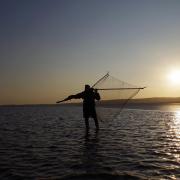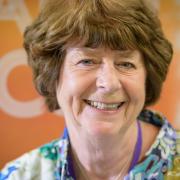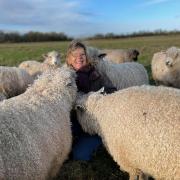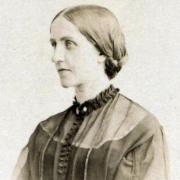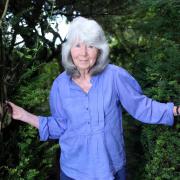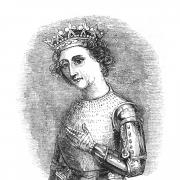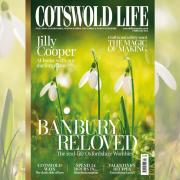Jane Bailey is an author whose novels combine romance with intrigue; the mystery of what it is to be human, entwined with deep and dark secrets. Fiction, she says, is entertainment. But it’s also a means of empathy – of putting yourself in someone else’s shoes – and of looking at your own problems through other eyes. Katie Jarvis speaks to local novelist Jane Bailey

“We write to make sense of the chaos; to give things shape: human beings always long to understand the world around them. And, as a reader, you sometimes think, ‘Yes! That’s exactly how I feel’. Suddenly, you become less alone.”
As well as being a novelist, Jane teaches creative writing to adults and children. For three years, she worked on First Story with pupils in schools serving low-income areas. Last year, as part of Gloucestershire Hospitals, she taught children unable to go to school because of illness.
“Very often, when young people write, they feel more comfortable exploring problems through ‘being’ someone completely different. Speaking in the voice of an elderly man, for example, can mean they’re more able to look at their own situation.”
Tell us about your latest book...
I wanted to write a modern ‘take’ on Daphne du Maurier’s Rebecca; but instead of a woman marrying a widower and being tormented by memories of the dead wife, Lark Song sees a man – Duncan - wooing young widow Freya. There are photographs of her ‘amazing’ husband looking gorgeous; everything he did was wonderful. Duncan doesn’t see how on earth he can compete: and this novel is about how he deals with that torment. Instead of the dreaded Mrs Danvers standing in his way, Duncan has to cope with three hostile children – each dysfunctional in their own way - and the dead husband’s mother. It’s almost ‘give-up’ time...except that there’s a spark between Duncan and Freya so important that he can’t give up.
Where did the inspiration come from?
When I started to write the novel, I’d recently married a widower and I was struck by the idea that, with a dead spouse, you can legitimately carry on loving them; whereas if you carried on loving an ex-partner, it just wouldn’t be acceptable. That made me think of Rebecca.
One particularly fascinating aspect of du Maurier’s classic is the power of the character who isn’t there. Other examples in fiction are the Great Gatsby, whose late arrival in his own novel makes him even more glamorous. Or even Captain Mainwaring’s wife in Dad’s Army - a very strong personality who never appears!
I wanted to write about a character who wasn’t there – or, at least, to write about someone being tormented by an absent figure. So that was the seed.
Who would enjoy your books?
Anyone of any age who enjoys a love story with a bit of mystery. My novels are all about human dilemmas, with an element of intrigue and an element of romance.
To what extent did the Cotswolds influence your writing?
I was born and brought up in the Cotswolds, and I live here still; I love the fact that I can walk out of my front door and see beautiful scenery; I can see landscape and trees, and hear birds singing. I don’t think the area influences me so much as being a comfortable space. If you’ve got a setting you know, it can feel like an anchor. But do bear in mind that my settings are also fictional: if I want to stick a church or a school in where they don’t exist, then I can get away with it!
Lark Song also travels to Rome, Verona and Florence. I spent a lot of time in Italy – and France – as a student, so they’re places where I regularly tramped the streets.
Where and how do you write?
I write on a laptop on my sofa, which is very bad for posture. I have to be warm and cosy so I tend to do a lot of my writing in winter, straight after breakfast until around two o’clock. If I have ideas later in the day, I’ll go back to it in the evening, but mornings are most creative. I don’t exactly hide myself away when I’m writing, but I am nicely hidden from the front door!
If you think about the length of a novel, the amount of time spent actually typing isn’t that much. The most important bit is having space to get into the zone and lose yourself. My husband, John, says he knows when I’m thinking about a novel because I look a bit glazed – such as when he’s having a conversation with me and I’m not answering!
There’s no doubt that it’s hard for all authors to find the time to write because other things constantly get in the way.
Which authors have influenced you?
My mum was awarded a book as a school prize - the only novel in our house when I was growing up. It took me a while to discover because it had a plain, dark cover, like a bible. It was Pride and Prejudice, and I was bowled over; transported to another world. I remember taking it everywhere with me.
As an adult, favourite authors include Alice Munro for her metaphors; Anne Tyler and William Trevor for their compassion; Michael Frayn for his Shakespearean ability to turn his hand to anything; and Elizabeth Strout - though I’ve only discovered her recently. I also love Rachel Joyce and Kate Riordan, who are both local.
Of course, I adore Daphne du Maurier. I deliberately didn’t read Rebecca again before writing Lark Song because I didn’t want to be too influenced.
Tell us more about your background?
I went to Pate’s in Cheltenham, Bath Uni where I did European studies, and on to Queen’s College, Oxford, for a PGCE, where I was apparently the first woman ever to spend the night there. (Officially, at least!). Then I won a scholarship to do a DPhil at Oxford, on special needs education, with Mary Warnock – but, for various reasons, I didn’t take it up. I ended up regretting that decision so much that I sat down and asked myself: What do I really want to be? The answer was ‘a writer’. I told myself that, if I could succeed at writing, I would forgive myself for having made such a stupid decision.
I went on lots of Arvon courses, including one where Beryl Bainbridge was the tutor. She took what I’d written and showed it to an agent, who wanted it. I’m now a tutor on Arvon courses myself.
If you could be any character from one of your books, who would you be and why?
I wouldn’t want to be any of them because I give them such a hard time! When you write, you do set your characters obstacles, though not particularly consciously.
What would be your Desert Island book?
Reading any book over and over again would drive me mad, but it probably would be Harper Lee’s To Kill a Mockingbird - perfectly formed. It deals with prejudice on several different levels and it has a wonderful child’s voice.
How easy was it to get published?
It wasn’t easy and I think it’s even harder now. The best advice I could give any aspiring writer is to go on an Arvon course - or similar. Reading your work out loud and sharing it with others can sound like a nightmare, but it’s really good for you. It’s vital to get honest feedback: being open to change and rethinking what you’ve written. The last thing you want, when you’ve just finished a book, is to be ‘edited’; in fact, it’s the best thing that can happen.
• You can order Lark Song through any bookshop; or from Amazon for £4.99, paperback, £3.98 on Kindle.




